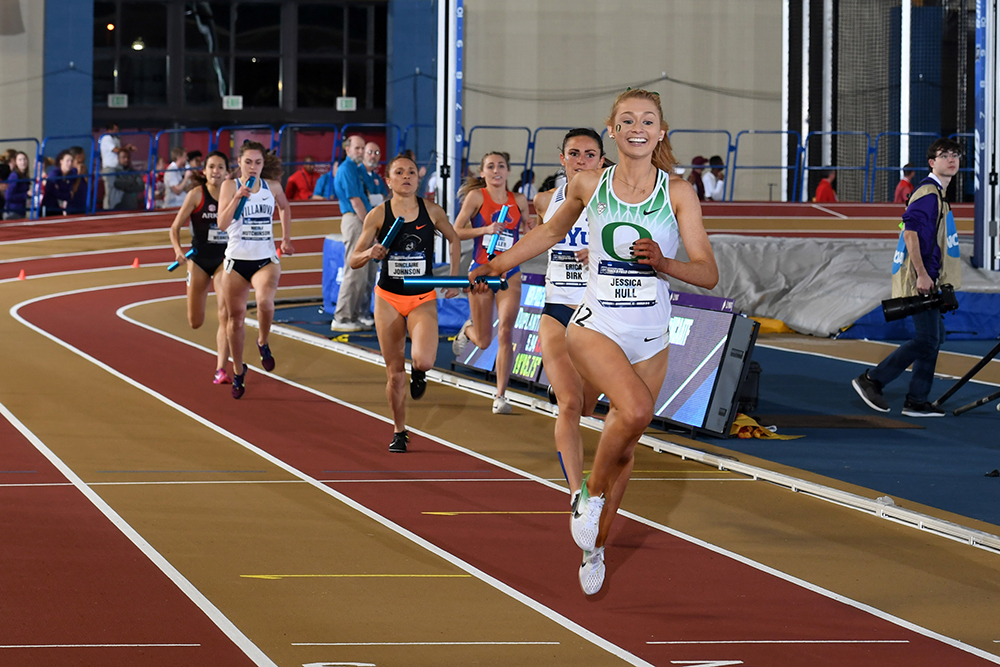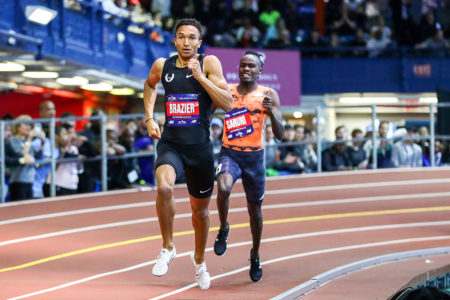
There were 5 women’s finals on the first day of the 2019 NCAA Indoor Championships. Here’s how they played out:
5000
Timewise, Alicia Monson wasn’t among the leaders but after her Millrose 3000 win against pros was certain to be in the mix. Not just in the mix. With 1000 to go the Badger junior pulled away from the rest, following Weini Kelati, took control over the final 800 and dispatched the diminutive Lobo soph with a 33.65 final circuit. Monson, planning to double back in the 3000, PRed at 15:31.26 to Kelati’s 15:32.95. “I try to be kind of reactive,” said the winner. “I know that a lot of times that if women take it out early, them doing the work kind of wastes energy. My coaches and I kept in touch and stayed relaxed. I knew I should wait until the end to go, but I wasn’t really sure when, but when I did decide to go I knew that was the time to take it.”
Distance Medley
Just sixth on the year list, Oregon was nonetheless the defending champion, and repeated as senior Jessica Hull’s 4:30.85 controlled the closing 1600 leg. BYU had led for the first three carries, while the Ducks, just 5th after the 1200, ran up to the front on the strength of fastest-in-the-field legs from Makenzie Dunmore (52.89) and Susan Ejore (2:03.52). Hull was challenged by BYU’s Erica Birk midway through the anchor but produced an unanswerable finish as the Ducks prevailed in 10:53.43, the No. 8 collegiate time ever, over school records by BYU (10:54.14) and Oklahoma State (10:55.01).
Long Jump
Jasmyn Steels, a Northwestern Louisiana junior, was only the =No. 9 seed coming in, but as the fifth jumper in the competition raised her PR from 20-9¼ (6.33) to 21-2½ (6.46) and the battle for 1st was over, but only when her second-best jump was taken into account. Deborah Acquah of Texas A&M came in with an even shorter PR, 20-8½ (6.31). She was only 9th leading off the last round, then somewhere she too found 21-2½ (6.46) skills and matched Steels. Best backups: Steels 21-1¼ (6.43), Acquah 20-½ (6.11).
Shot
Top seed Sade Olatoye took the lead in the first round with her 56-6½ (17.23). The Ohio State senior never improved and ended up only 5th. In the second round Samantha Noennig upped the ante to 57-9 (17.60) and that remained the top put until the penultimate try of the competition, when Stanford senior Lena Giger upped her PR to 58-8½ (17.89). But Noennig responded brilliantly, closing out the competition with a PR of her own, 58-9¼ (17.91). “When it left I knew it was a good one, but I wasn’t sure how far it would go,” said the Arizona State soph after posting the year’s farthest collegiate mark. “I just knew I had to stay calm and it worked out well.”
Pentathlon
Yearly leader Michelle Atherley came into the meet with a bulge of 126 points over her nearest pursuer. She left with that gap raised to 135. The Miami senior strung to together marks of 8.16, 5-10 (1.78), 42-8¼ (13.01), 19-11 (6.07) & 2:14.34 for a list-leading PR of 4547. That moved her to No. 9 American ever and No. 7 collegian). Closest to her was Kennesaw State’s Jordan Gray, with a PR 4412. Overall, it was a PR-fest, lifetime highs going to the top 6 and 10 of the first 11.






